It’s Oscar season so a load of films bait me into watching them at their peril! Released a few days early as I haven’t really got time to watch anything else before this Q is up.
Queer (2024, dir: Luca Guadagnino)
I’m not the most Burroughs-knowledgeable guy around town so I can’t talk about this as adaptation. As a period drama capturing that Malcolm Lowry-esque whitey-goes-mad down Mexico way, there’s something to be said for stretches of a film that is otherwise just alright.
Daniel Craig, a formidable actor pre-Bond, carries a lot of this on his back. His ability as an otherwise hot guy to be frail and pathetic and weird might be currently unmatched. The scene where he is caught flush in the gaze of the man he adores and doesn’t know what to do, so he embarrasses himself, was incredible. Apart from that the film tails off wildly in the second half and ends in bathos.
Vlny (Waves) (2024, dir: Jiří Mádl)
March to May (2024, dir: Martin Pavol Repka)
The Gardener’s Year (2024, dir: Jiří Havelka)
A trio of recent Czech (or co-productions with Slovakia) works seen in various Prague cinemas in early January 2024. Waves sets a formulaic tale against an interesting backdrop (the Prague Uprising) but turns it into period pish about the importance of a free press nudge nudge Mister Putin Mister Musk are you listening (no). Someone needs to invent a word for the period-accurate but weirdly-wrong feeling that this kind of costuming and design conveys:
I just don’t think people stood like that or had such good skin then. They hadn’t even invented Vitamin C. At least three of these people should smell strongly of that green soap they used to have in municipal toilets. Compare/contrast Smoke, later in this blog.
March to May is so gentle that it may not have even happened. A Slovak family living in a quiet village outside of Trnava experience modest upheaval when the mother becomes pregnant, worrying about the effect it will have on her teenagers. It’s a drama but the observational style will convince many of its authenticity. For me, it was a little edgeless and sleepy, but I did have a pint of dark beer before I went in.
Much better and the current holder of best film seen in 2025 was Jiří Havelka’s The Gardener’s Year. The film adapts a whimsical text in exultation of the home gardener, written by Karel Čapek (inventor of the word ‘robot’ and generally better known for his excellent sci-fi), and uses its month-by-month structure as a way of simultaneously developing the narrative and providing a beautifully ironic tasting note to the central drama of attempting to control nature.
An old gardener finds that someone has bought all of the land around his nursery. The unseen purchaser then starts to pressure our old lad into selling up. He refuses, and the asymmetric war begins.
The gardener never speaks (his wife has two lines) and we never meet the unseen rich person pulling the strings. One day, the gardener tends to his bees to find they've all been killed. Then the small stretch of road between his property and the main road now has a security guard operating an arm gate. Then his plants are destroyed.
The gardener's response, most of the time, is to carry on. To keep planting, to mend damage, to suppress, to keep going. We see him dealing with bureaucracy - local officials, police - but they're no help. Some of his plans work out better for him (the rich person switches the water mains off, the gardener taps a well) but the grind wears him down. Eventually he shows an emotion, a small movement of the face that is more devastating than anything in Nosferatu.
The blend of comic absurdity and righteousness really works here because of the gentle framing of it. It's kind of like a Play for Today, with a made-for-TV feel. This means that it is intimate and ordinary and modest, capable of being funny one minute and completely boring into your heart the next.
Between the scenes of dramatic propulsion are vignettes of the gardener and his wife working, silently, doing their daily thing, happy in their life, producing food, solving a massive jigsaw: it makes everything feel lived in and not just some trite little man vs. big man thing. The resolution re-frames much of what you've seen too, in a way that widens the focus and makes it applicable to you, if you've ever butted heads with power. I’m sure there’s a specific target here (probably Russians and weak power structures at home) but making it general and quiet and open works in the film’s favour massively.
Time Out (2001, dir: Laurent Cantet)
Superlative drama about a man keeping up the pretence that he is working even though he has been fired before the film even starts; a serpentine work about the need to be seen to be doing, to be thought of as a doer, the work of non-work, a film capturing discrete emotional states. I knew I'd like this from the opening shot, with our protagonist asleep in his car in some miserable lay-by in a non-space, immediately switching on when his phone rings, a stage-right cue to get back into character.
The car is this one location where we see Vincent not performing and sometimes even at peace. The rest of the film is him stitching together performance after performance until the elastic snaps, because you can't outrun not working. The final hour can be read as a move toward a different genre, but really it is the other side of the work coin: crime.
The film, to be fair, isn't absolutely perfect: lots of people vocalise their thoughts on the main character's work life at expense of anything else that make us think he should bother to maintain the act. However, Cantet gets so many of the little tonal decisions and emotional greynesses right that I forgive it.
Nosferatu (2024, dir: Robert Eggers)
The first ever new film I’ve seen in IMAX meant that I got to see a particularly awful film for more money on a larger screen. To rebut the things said by people who don’t like it but wish to seem balanced: no, Lily Rose Depp isn’t good in it (give me a break from posh honking emotionality, and not by imitating Isabelle Adjani), the cinematography isn’t interesting, Orlok is not ‘fun’ (he is, to quote former Twitter sensation Bart_simsonreal, terbil). Everything it adds to Murnau’s original is a detraction.
A Real Pain (2024, dir: Jesse Eisenberg)
Similar in tone and execution to The Trip, only this time two bickering middle-aged American men go to Poland and wrestle with guilt rather than do impersonations of Michael Caine at each other. It’s ultimately too slight to quite wrestle with its multiple locations of contemporary sadness, but I do think Kieran Culkin is currently an actor who is representing a type of recent guy that had not been represented before; bipolar and fed up of being course-corrected back toward normality.
A Fidai Film (2024, dir: Karim Aljafari)
A complex and largely inscrutable work of experimental documentary: Aljfari takes charge of a rediscovered archive from 1982 in order to remediate the colonial situation in Palestine and Lebanon. It’s all effect and no clear cause, a modern Trümmerfilm - only the rubble of the past still exists in the present.
The curator played 15 mins of an interview beforehand, just all of us sat in the dark listening to this MP3, where the director talked about trying to get footage off Israeli academics of post-colonialism and finding they wouldn't because they were married to IDF soldiers and politicians. Insane, beyond rating, but glad I saw it.
The Brutalist (2024, dir: Brady Corbet)
The narrative and general plot of The Brutalist is not far removed from Foxcatcher: a period drama about a capital-poor traumatised person with skills and family issues exploited by a Pennsylvanian mega-capitalist with mother issues; the relationship that threatens to enrich both goes sour when the financial exploitation becomes entwined with physical and sexual exploitation. The Brutalist has a more worldly-treatment and its release near to the 80th anniversary of the liberation of Auschwitz (like A Real Pain) feels like no accident.
Your experience with this will depend on where the post-intermission part of the film takes you. The first part is reasonably straightforward and tidy: Laszlo arrives and the most beautiful scene occurs as he meets his old friend, gets a job, and then has an undertaking goes sour. The second attempts to stretch the fabric a little more in order to show where all the little threads have been leading to. For me, it was a little thin, and the pre-film focus on length and construction but not on emotional content now seems telling.
There is also a debate raging around whether this film “normalises Zionism”. It is true that some characters leave America for Israel, as was certainly happening throughout the middle and late 20th century. There’s also mis-treatment of women, racism, and a disabled person who gets physically assaulted and I don’t think the film is endorsing any of those things either.
Star Trek: Section 31 (2025, dir: Olatunde Osunsanmi)
A made-for-streaming feature film-length work developed out of an series abandoned by COVID and the diminishing interest in new Star Trek (fans call it Nu Trek) subsequently thrown up on Paramount+ in the midst of the For Your Consideration bloc of film releases feels like the producer-side faith in this was low.
I’ve written a quite long review that focuses on the formulaic narrative whilst trying to give some general context in support of the idea. However, and this might seem like an overly-rarefied complaint, I think that Star Trek established from 1966 to 2001 and over 600 episodes of television a particular style and method of perspectivisation that is crucial to its entire being, and that a work like Section 31 is completely counter to it.
To be clearer: the point of interest of Star Trek is its political flaw - the crew are liberal world police sailing around encountering things from the outside, lightly grasping complex cultural problems and hoping to leaves traces of our paternal and sophisticated Earth politics on the bickering aliens of the universe be they barbaric warrior-caste madmen or technocratic communists. Roddenberry-style optimism toward an integrated multicultural post-scarcity future with the West as genial beneficial overlords seems insane; it’s one of the reasons why the novels of John le Carre post-Smiley also seem completely out of time.
Section 31 is a work of, both aesthetically and industrially, ingrained cynicism and disdain toward its audience. The ending even mocks the very conceit of Star Trek itself. You might think of The Next Generation as a strange and slightly rigid throwback of that predated the golden boat of prestige television, but there’s a rigour and development of a particular and identifiable tone that grounds its experiments in genre (ie. the holodeck episodes). The tone of Section 31 is one that belongs to several media properties simultaneously; notes of Star Wars, Game of Thrones, James Bond, Mission: Impossible and others crop up, each one providing a contrasting flavour profile to Star Trek’s gentle exploring that, ultimately, destroys it.
Taken as a non-Star Trek property, a discrete work of space posse vs. the big bad, it is perfunctory to the point of inertia.
Family Gbese (2024, dir: Michelle Bello)
Hyperactive Nollywood farce about a man who thinks he has made it in life, only to find his brother has debted and he must now choose between family and career. Does that Nollywood thing of refusing to settle for one genre even within a scene, making for tonal whiplash on a minute-to-minute basis. Hate to say it but this is very bad.
Blink Twice (2024, dir: Zoe Kravitz)
A lot of people I know had seen this ahead of me (it’s on Amazon Prime, which I never check in on) and had reported that it was “Total balderdash! Agent Cooper really will take any role put in front of him” and “total turd and one of the most cringeworthy things I've seen in a while.” Sounds great, let’s give it a go!
After The Menu and the terrible Glass Onion sequel and now this it might be time to retire the ‘awful rich guy with an island’ story. It is also terrifically on the nose about current events in a way that will chip away at potential for lasting meaning. However, I thought this was a decent and well-made film that creates a strong and consistent tone and does a lot with off-screen suggestion and vagueness around memory.
Babygirl (2024, dir: Halina Reijn)
Nicole Kidman, playing Jeff Bezos, can’t cum with her husband Antonio Banderas (styled like Paul Hollywood). Walking down the street she sees a wild dog tamed by a sexy young man because he has animal magnetism do you get it? He’s an intern but he also doesn’t seem to care that she’s the CEO because in America those three letters charges you with the same rights as a feudal monarch. This must mean that he is good at sex, which he is. Eventually the affair, which threatened her job and relationship, is revealed and affects neither job nor relationship. Instead Kidman-Bezos talks back to a man who had no real role in the film up to that point and then goes home and cums with Banderas thus proving you can still get more when you have it all. Awful film.
Boundless (2024, dir: Ole Christian Madsen)
The sixth film in a series adapted from the Department Q novels by Danish writer Jussi Adler-Olsen. The series has become a small publishing sensation across continental Europe and the adaptations are all money-makers. Its success may continue in the Anglosphere as Netflix have just picked up the rights to adapt the books, moving the setting from Copenhagen to Edinburgh.
Department Q is a cold case unit and the central character is Carl Morck, a reasonably talented gumshoe with an inscrutable semi-scowl masking paternal pain. His squad is rounded out by the Iraqi-Danish observer-facilitator Assad and the traumatised-but-tough Rose Knudsen.
I’m interested in crime narratives because I think that, in a particular way, it is the genre or approach that can tell the most interesting stories. By that I mean this: a sleuth or even basic officer or spy has the licence to go anywhere from the rich man in his castle to the poor man at his gate. Crime is, at its heart, social. The crime genre can reasonably accommodate the entire social vista, examine it, and draw connections. Crimes committed are generally a product of the society they are committed in. For good examples I would cite The Wire, Cracker, the Cold War-era novels of John le Carre, and the Martin Beck novels by Maj Sjöwall and Per Wahlöö. In fact, Department Q just wrapped its novel series after ten editions - a clear nod to Sjöwall and Wahlöö wrapping up the Martin Beck stories after ten.
Scandinavia has continued, after a short interregnum, as the home of crime fiction. Though there are examples that attempt to articulate the social dimension of crime, my experiences with Nordic Noir and other Scandi crime are that it mistakenly believes that society is generally fine but crimes within it are undertaken by supergenius outsider figures with elevated grudges or breakers of the social fabric: Swedish-Danish co-production The Bridge had a perp who mastered the art of pinpoint timing and scientific exactitude, and it required the superpower of cold reason to take it down. It was terrible and got worse over four series. Crime’s own self-love with increasingly baroque and original crimes and idiosyncratic cops is part of its downfall.
Boundless begins with a decent hook: a cold case on the Baltic island of Bornholm involving a dead girl found in a tree lures Knudsen, but not Morck (presumed licking his wounds from a previous episode), to investigate. Knudsen arrives at a retirement party for a senior cop who pulls a gun on his boss before showing his hand to a camera with CARL MORCK written on it in biro and then blowing his head off.
Though unlikely, the opening scenes establish the senior police as likely obfuscators. There’s also a school with a very creepy caretaker who attempts to sexually assault Knudsen. Someone gets their tongue cut out. An artist makes money on the dark web selling images of the dead girl in a tree. All four of these things are ultimately red herrings. Such a whirlwind of Things Happening goes down that it hopes you forget that the guy blew his head off to get attention on a case, rather than for a deeper reason involving his fish-faced boss or his son, a heroin addict found dead in the next scene.
It is this combination of unlikely events and slender motivations that persists in Boundless and turns it from a pleasantly down-to-earth crimeur to a below average madcap action-adventure. I haven’t even mentioned that a good deal of this narrative takes place in and amongst a cult of sunworshippers led by a charismatic outsider who is fucking his half-sister; she happens to conveniently be a martial arts master responsible for a body count higher than the ending of Inglorious Basterds.
With the cult vanquished, the crazed artist committing suicide (‘to complete my artwork’) and the ultimate murderer also taken care of (I won’t spoil everything) the social order of Bornholm is restored. But the restoration of social order is a narrative idea and not a real one undertaken by police: Cracker and The Wire and George Smiley knew that you do things because it’s a job necessitated by the world being perpetually imperfect.
TL;DR trite rubbish. Ban Scandinavian crime in our time.
Smoke (1991, dir: Tomáš Vorel)
A self-remake of Vorel’s student graduation film and a “musical of the totalitarian age” made just after the collapse of the Eastern Bloc. Smoke is a strange and fun Brechtian romp through factionalist politics played out in a belching and monstrous workplace (shot around Dolní Vítkovice, at the time a functioning ironworks). There’s also a very queer subtext running through this that I couldn’t quite make head or tail of.
Mirek is an engineer fresh out of university. His new job is quite content for him to not do anything and to not rock the boat. When he starts to develop a plan to have the factory pollute a lot less, the bosses shut him down like they did the last engineer who tried the same thing. The allegories of Soviet life write themselves, but the songs and the committed performances are inspired.
Owners (2019, dir: Jiří Havelka)
After seeing The Gardener’s Year I picked this up from a Prague DVD store (Terryho Ponožky inside Kino Svetozor in the New Town) to see what else Havelka had been up to in the relative infancy of his film career (having spent ages in theatre).
Very Play for Today that works on the level or as a general allegory for a capitalism undoing the social fabric. A housing committee meets and the building has issues, but everyone has different reasons for opposing the plethora of things that need doing: there's an old commie who opposes selling the common space to raise the funds, a woman who won't install a lift because she's on the ground floor, arguments over who uses the most water, lights, bin space (all spurious based on impressions of each other's lifestyle).
There are also interlopers - a new couple who have no say as the rulesmith won't let them, two brothers whose dad has died who seem to want to take control, an idiot son whose mother is in the hospital, and a crook businessman who is advising one owner who doesn't even live there. It's frustrating by intent and if you've ever been part of local politics or a bureaucratic body then you'll recognise everything here as true. Perhaps its subtlety is unpicked by the ending, but it is good all the way through. Buy stock in Havelka.
Hard Truths (2024, dir: Mike Leigh)
After a run of a couple of middling-to-poor history inflected films, Leigh returns to home turf in style. Two sisters and their families are sketched; one full of joy and life in the face of pain, the other poisoned by trauma, misanthropy, bitterness, and sickness.
The more I think about it the richer it gets. In the powerful dramatic centrepiece, the two sisters meet at their mother’s graveside, something unspoken about the past lingering. Is this a trauma given asymmetrically? Can we reject emotional inheritance? Are some people just wired wrong? The film gives no answers but asks some great questions and the two central performances by Marianne Jean-Baptiste and Michele Austin absolutely crush.
The Counsellor (2013, dir: Ridley Scott)
Savaged at the time and written off as a contender for ‘the worst film ever’ (though it has fans) I don’t think this Cormac McCarthy-penned flop will be making a critical comeback any time soon. Uninterested direction and uneven performances from the likes of Pitt, Fassbender, Cruz, Bardem (and many more) abound but it’s really McCarthy who foots the blame here: what works as descriptive prose sounds like rigid cosmic mumbo-jumbo out of the mouths of these actors. Excruciating.
Witness for the Prosecution (1957, dir: Billy Wilder)
Anatomy of a Murder (1959, dir: Otto Preminger)
A courtroom double bill, with the decision to watch Witness coming out of a conversation over dinner after watching Anatomy to decide what the best courtroom drama of all time is. Please post your thoughts below.
Some say the best is Anatomy but I disagree: its use of the trial as a means of orchestrating the formal qualities of the film are uneven, and Jimmy Stewart plays slightly on the wrong side of the hokey/homespun line as the defence lawyer. It’s a good film that leaves ambiguities dangling and prods at American morality, but it rushes to a conclusion that amounts to bathos.
Witness is lighter on the surface, with Charles Laughton throwing out one-liners like he’s being paid £1000 a go, and the intricate first act having the deftness and choreography of a steroidal ballet. It’s an Agatha Christie, so it is very formally precise and twisty, but Wilder gradually builds layers that give it a bit more meat, such as Marlene Dietrich reprising her strange gender-fluid performance from Morocco as a neat psychological point.
Both films make the basic error of the trial introducing hot new evidence right at the very end (pretty sure this isn’t on in either the UK or US systems) but it’s a more convincing film by far, right down to the replication of the Old Bailey on a studio lot in Glendale.
La Captive (2000)
Rue Mallet-Stevens (1986)
Toute Une Nuit (1982, all dir: Chantal Akerman)
Some weaker efforts from the Belgian behemoth: a Proust adaptation, an incomprehensible commissioned short and a longer formal experiment set over a lonely sultry night in Brussels. La Captive has some good moments and for the other two, if you like photography and interior design and don’t care much for traditional narrativity, then you could be quids-in.
Nine Queens (2000, dir: Fabien Bielinsky)
Entertaining heist film in dialogue with Argentina’s own kleptocracy that possibly caves in near the very end under its constant twistiness. Done in a kind of handheld New Hollywood way, no wasted arsing about, is talking about something without bashing you over the head (well except where the bank is a bigger ass than any man can be). Can't imagine how the US remake (Criminal) works given that the banks collapsing is a plot point, but structurally it is very familiar without being tired.
Bacurau (2019, dirs: Kleber Mendonça Filho and Juliano Dornelles)
A village in remote Northern Brazil in the future falls off the map and becomes predated upon by a gang of tech-vested American sport hunters. DID SOMEONE ORDER A METAPHOR? I quite liked this on-the-nose couple of hours.
Emilia Pérez (2024, dir: Jacques Audiard)
The villain of the last few months owing to various critics attacking it on the point of its treatment of Mexico, the disappeared of the various narco wars, and LGBTQ+ issues. I wanted to put all that to one side because I think Audiard has made some good work before in cultures that ‘aren’t his’. He’s more of a formalist, a Greek tragedian, and mise-en-scene is something that you plug form into to show the universality of things.
The basic story is that the baddest narco of them all wants Zoe Saldana, a lawyer, to sort everything out so they can complete their gender reassignment and make a clean break into a new life. Much later, her external appearance changed, the same torrents still swirl: very Greek. And, if you like, a bit crass.
However: there are songs and dance routines. These help to give Zoe Saldana something to do other than look downcast, briefly girlbossing through some expository song-dialogue, before returning to normality to observe and facilitate everyone else’s drama. Audiard thinks he’s doing Dennis Potter here, but he’s much closer to Lin-Manuel Miranda.
Does it fatally traduce trans life or Mexico? No, because it’s so superficial that it could be the exact same film if Mexico was was nearly any country or a fictional planet and being trans was becoming half-robot or something: they’re just devices to give piquancy to a central narrative. The problem is that it is just very shallow.
Marching Powder (2025, dir: Nick Love)
The new DYER x LOVE joint is probably their best collaboration to date. It has its cake and eats it by being a critique of hooligan / aimless bloke life and still managing to get plenty of tasty violence lovingly shot with absolutely loads of anti-PC humour.
There’s a scene where Dyer and another normal man smash up some hipsters in a WeWork type place. There’s always been a bit of suspicion of liberal types in Love’s films but here it lands a bit more strongly because he joins the dots and realises they’re actually that modern stripe of posh landbaron/tech guy who has assimilated the rules and codes of the liberal. Other, easier, targets like vegans and men with feelings get a much more gentle treatment.
It isn’t great, of course, but it works better than your average Love film because there’s a more considered shifting of weight to the effect of such behaviour on families. Of course, Alan Clarke did this neatly in a tidy 65 minutes in the original The Firm - and without the mawkishness.
Black Bag (2025, dir: Steven Soderbergh)
Featherweight Tinker Tailor clone.
The Electric State (2025, dir: Anthony and Joe Russo)
Millie Bobby Brown and her robot of limited communication meeting hunky smuggler Chris Pratt and his sidekick of ability doesn’t automatically make this a rip of Star Wars, and besides they’re too busy remixing a load of other things too whilst ignoring the spectral decrepitude of the source text. A generic clunker that begins by just expecting you to go along with the emotionality of the central character based on knowing her from a previous television show with similar themes. That’s not writing: it’s photocopying.
Memories of Murder (2003, dir: Bong Joon Ho)
Decidedly not going to see Mickey 17 but I made up for it by seeing this from my ever-growing laterbase. It’s good! Memories is based on a real set of crimes, the first serial killer in South Korea, but I think Bong's attention isn't so focused on the real case and more the case of a country and people struggling to emerge from an uncritical past.
Song Kang-ho (the dad in Parasite) is the lead rural cop, who believes he can just tell a criminal by looking at him; his partner prefers to violently beat confessions out of suspects. A Seoul officer comes in with faith in hard work and documentation; between them they stumble around never quite piecing things together, blind to the real reason that gives shelter to the murderer. It oscillates between procedural and anti-procedural ie. examining procedural flaws, framing the police's methods as dodgy in a way that reminded me of Death by Hanging.
I was talking about this on some forum and a reply came to the effect of ‘the last shot is one of the best in all of cinema!’ I guess I didn’t feel that, but maybe you will? It is quite funny too.
Snow White (2025, dir: Marc Webb)
The political hot potato of the quarter from the perspective of a pants-shitting baby is this update of the 19th century fairy tale. I’m not going into all of that because it is tiresome.
The narrative updates render this closer to Robin Hood: there’s a bandit group in the forest who demand the one true king’s return and an end to indignity for the poor, Snow White galvanises them and the dwarves and the people of the kingdom against the wicked IDF ham Gal Gadot.
Meanwhile the songs are in that ghastly form that American musical theatre does as default (aside from two originals from the 1930s version, which are better) and some of the CGI is a bit deranged and emotionally manipulative (weird side-plot about Dopey not being stupid, just sensitive, ugh).
That said, there is a wordless section where Snow White runs from the huntsman and falls headlong into a glade populated by adorable critters that approaches some of the old magic. And Doc has a line about criminals existing in a liminal moral space (!) that I liked.
Little girls will like it, old gits like me won’t. Perspective please.
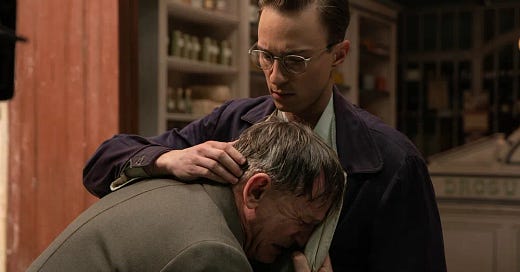



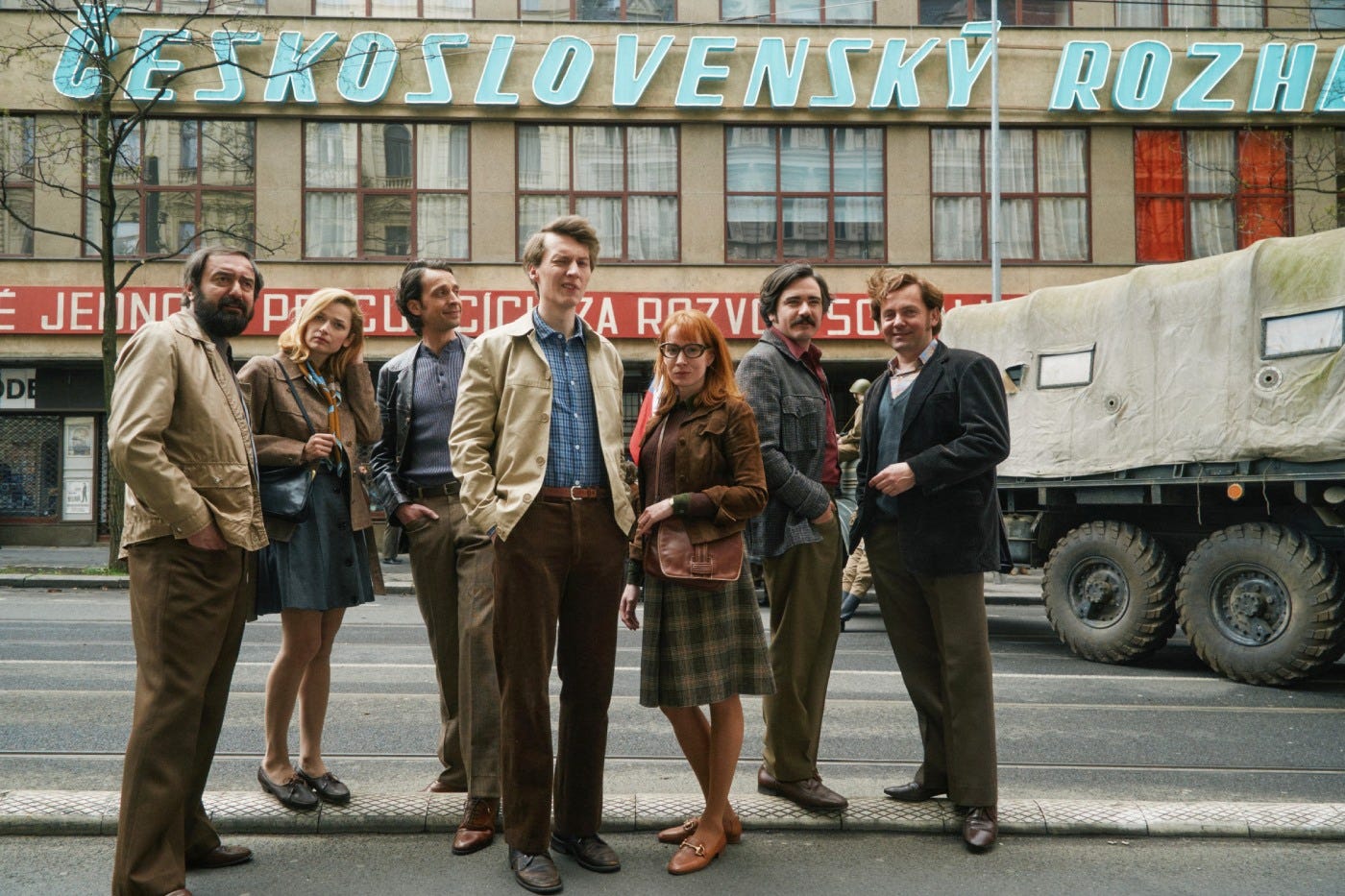


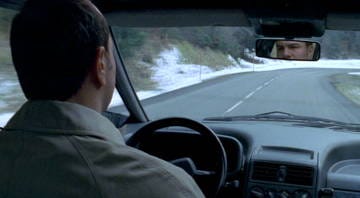
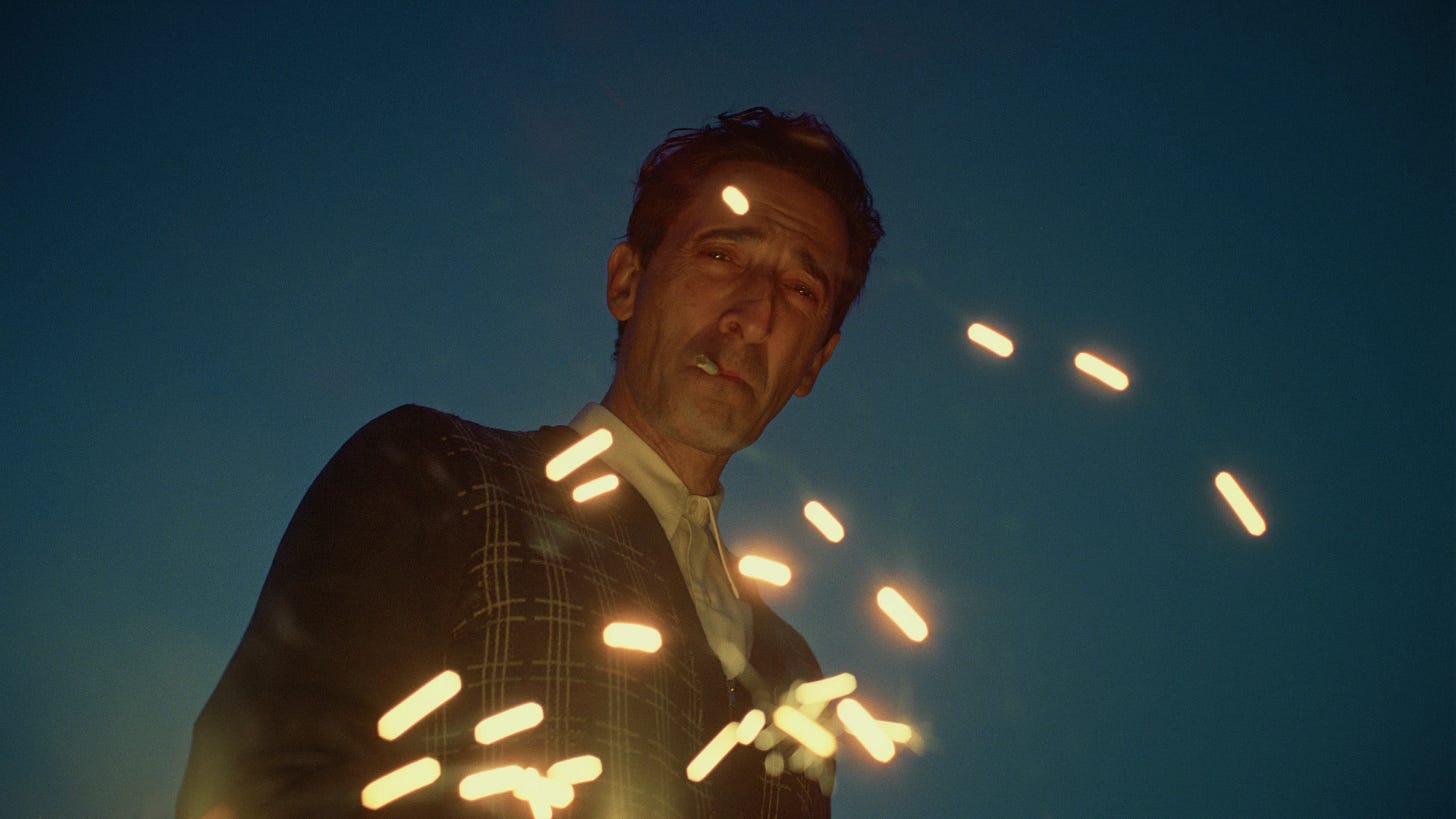


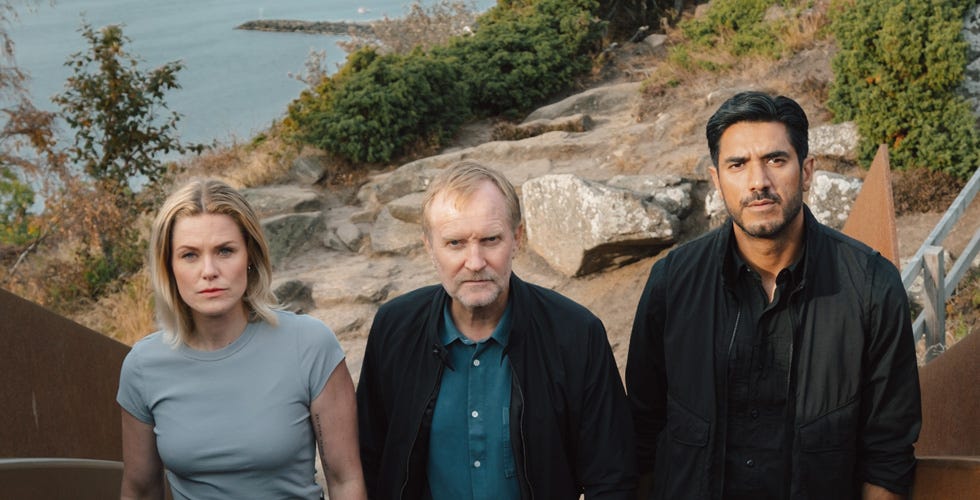
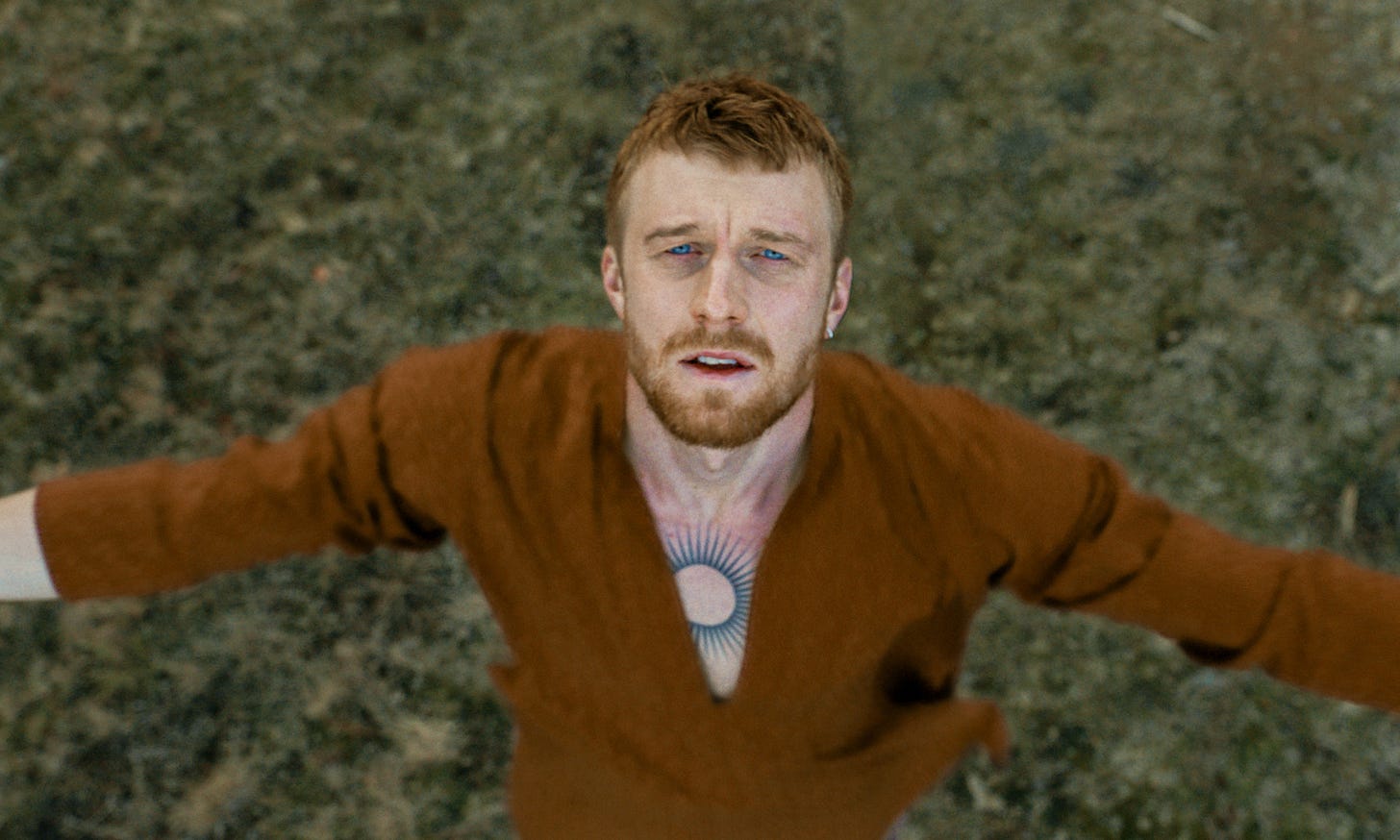
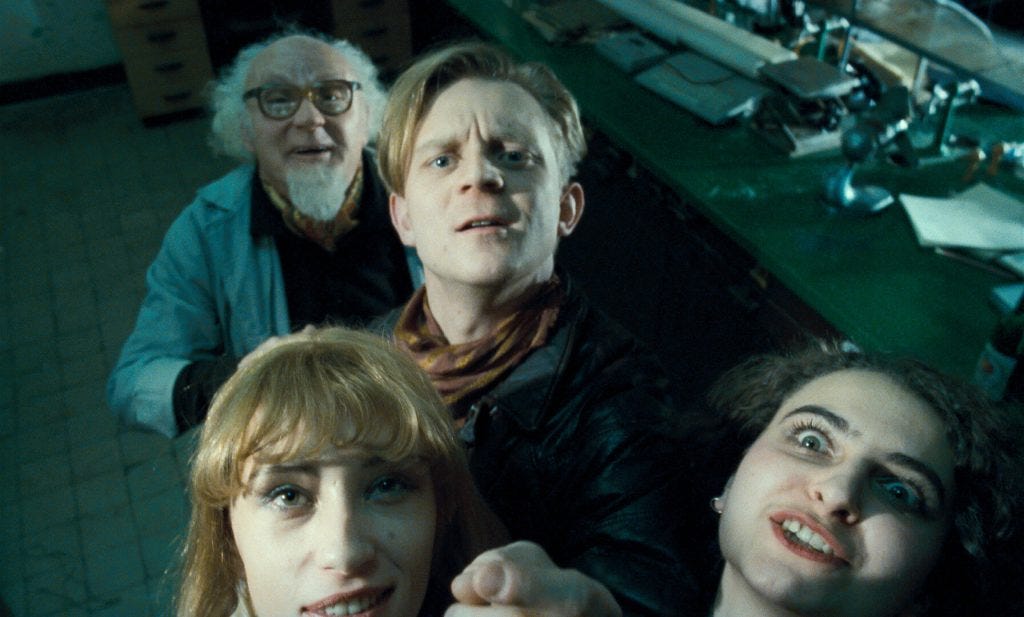
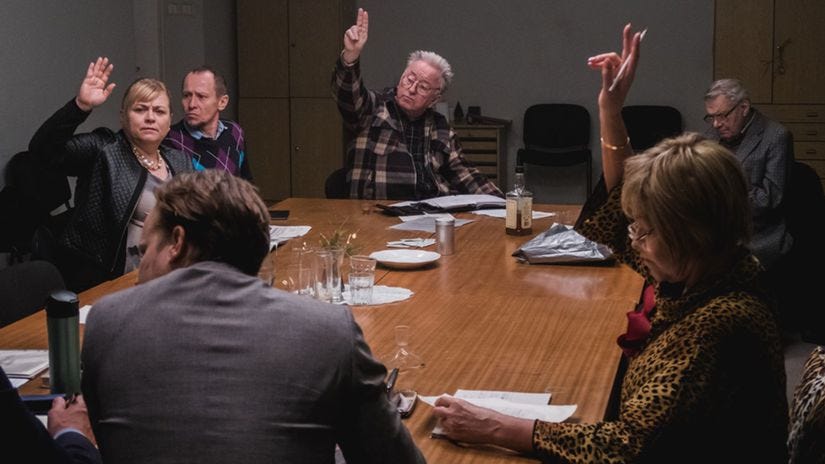

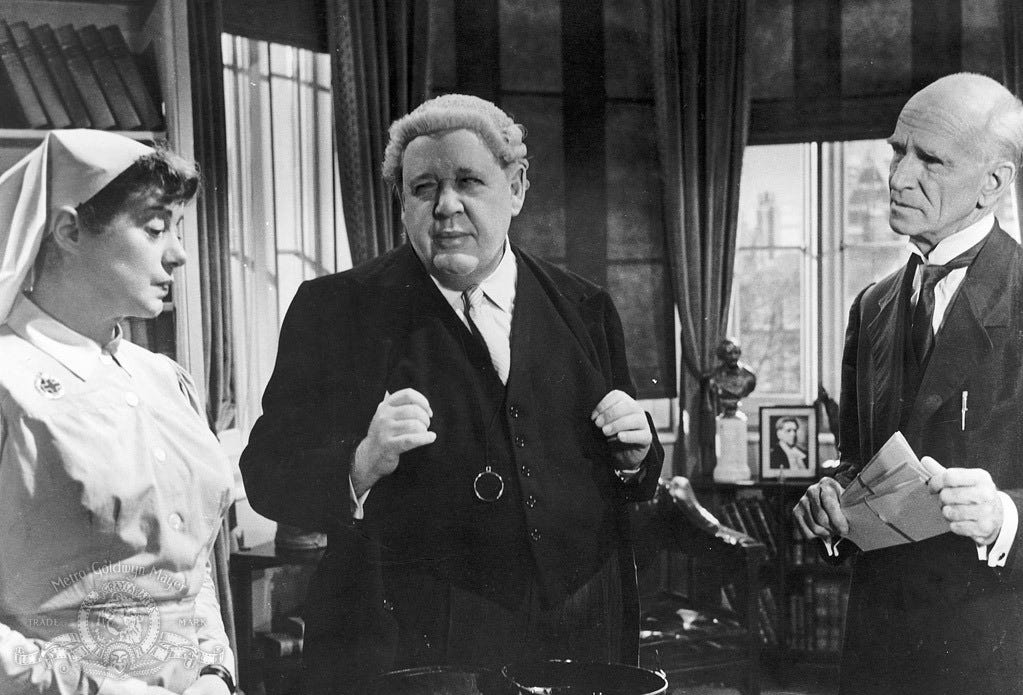
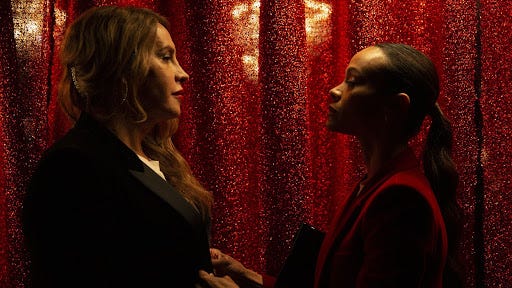
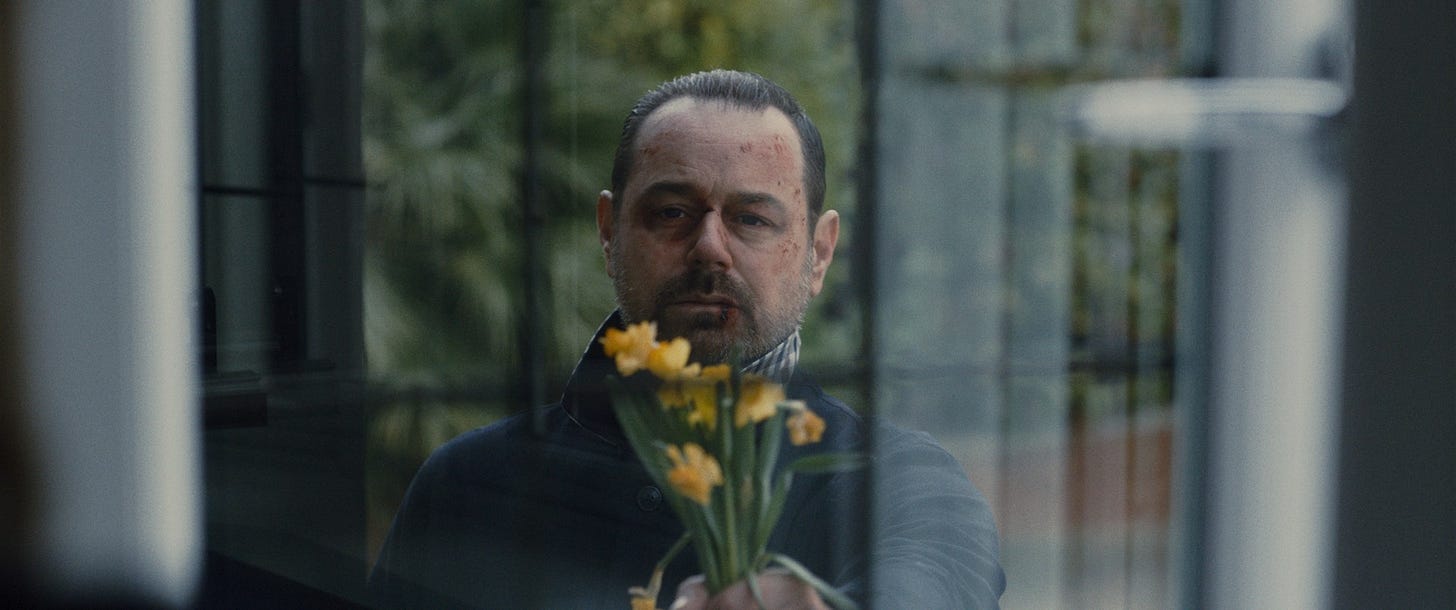
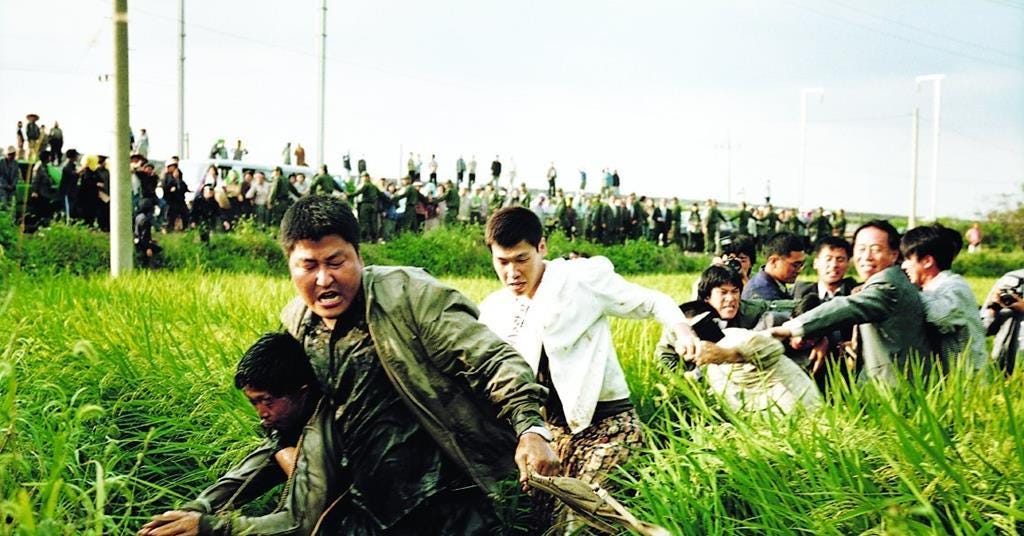
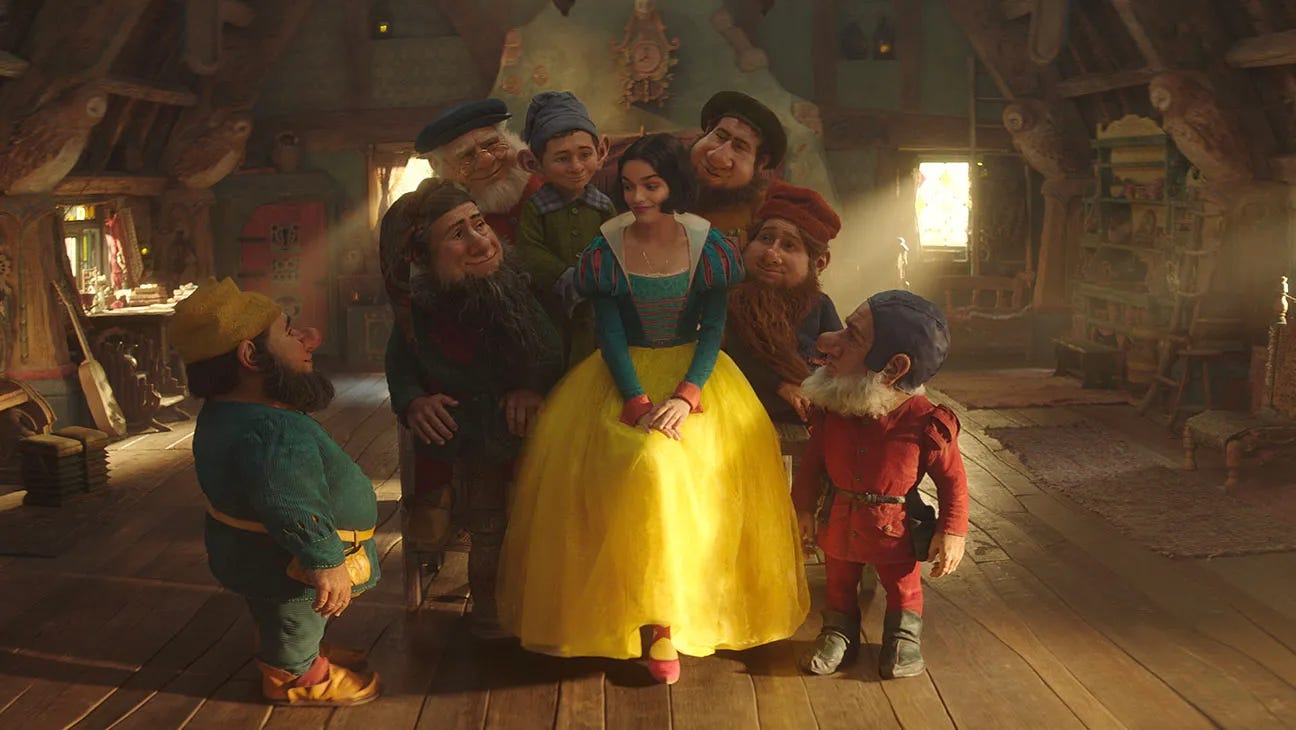
I think it probably is Witness for the Prosecution, but I like The Verdict a lot.
Juror #2 from last year was solid, and my parents would almost certainly say A Few Good Men, so I have a fondness for that too